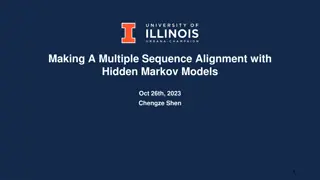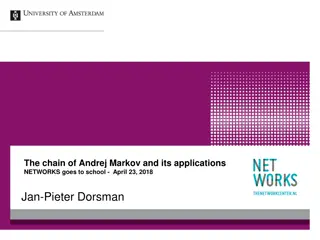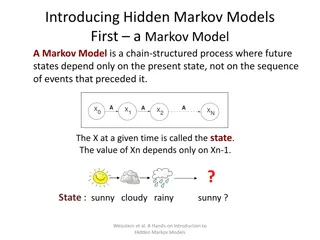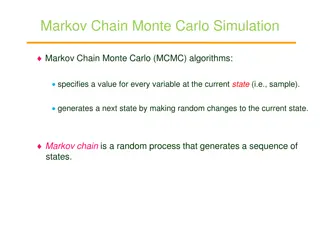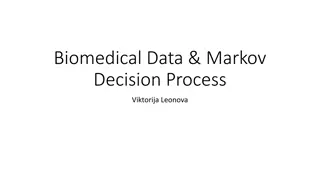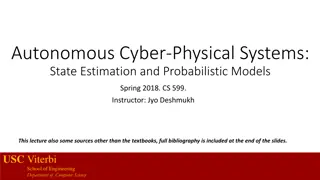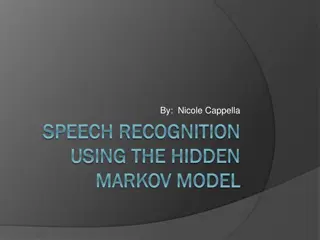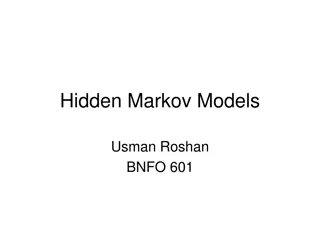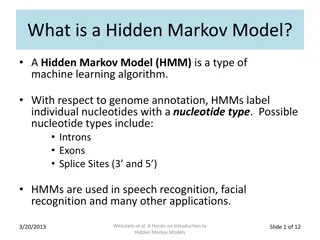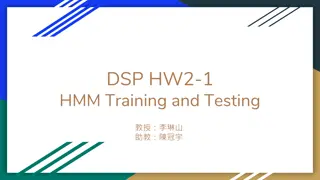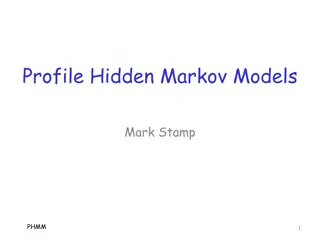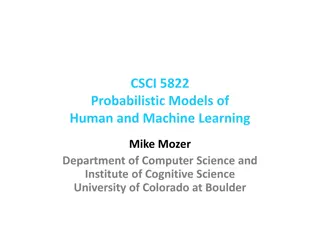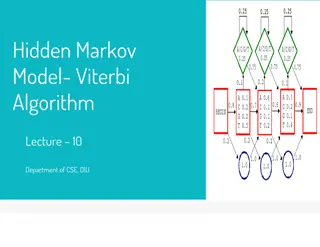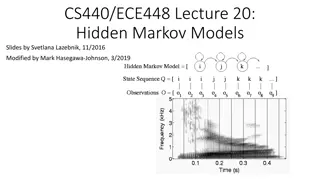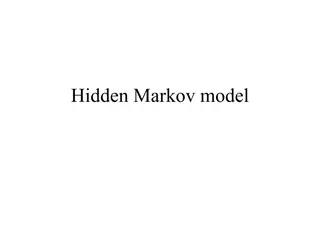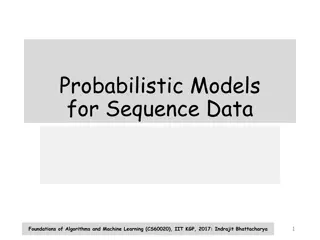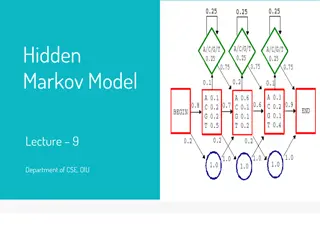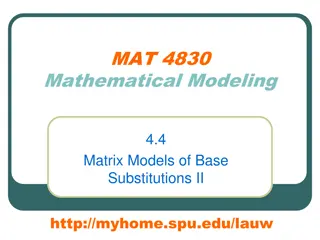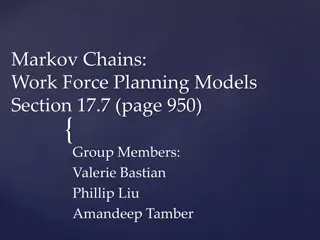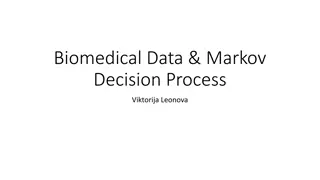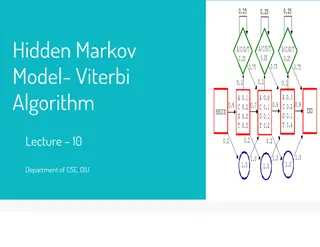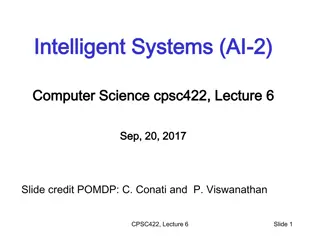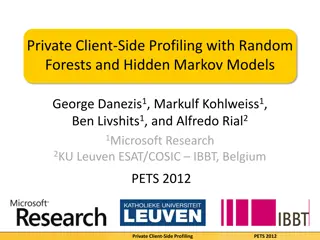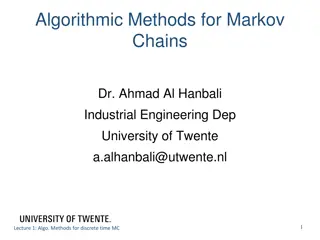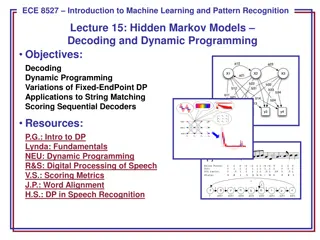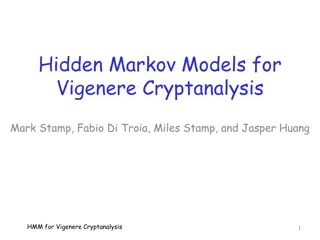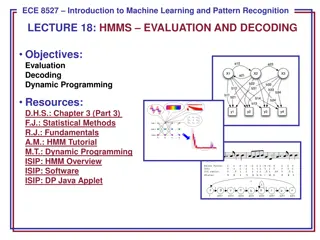System Models in Software Engineering: A Comprehensive Overview
System models play a crucial role in software engineering, aiding in understanding system functionality and communicating with customers. They include context models, behavioural models, data models, object models, and more, each offering unique perspectives on the system. Different types of system
6 views • 33 slides
Multiple Sequence Alignment with Hidden Markov Models
Multiple Sequence Alignment (MSA) is essential for various biological analyses like phylogeny estimation and selection quantification. Profile Hidden Markov Models (HMMs) play a crucial role in achieving accurate alignments. This process involves aligning unaligned sequences to create alignments wit
0 views • 29 slides
Markov Chains and Their Applications in Networks
Andrej Markov and his contributions to the development of Markov chains are explored, highlighting the principles, algorithms, and rules associated with these probabilistic models. The concept of a Markov chain, where transitions between states depend only on the current state, is explained using we
20 views • 21 slides
Introduction to Markov Models and Hidden Markov Models
A Markov model is a chain-structured process where future states depend only on the present state. Hidden Markov Models are Markov chains where the state is only partially observable. Explore state transition and emission probabilities in various scenarios such as weather forecasting and genetic seq
2 views • 12 slides
Introduction to Markov Decision Processes and Optimal Policies
Explore the world of Markov Decision Processes (MDPs) and optimal policies in Machine Learning. Uncover the concepts of states, actions, transition functions, rewards, and policies. Learn about the significance of Markov property in MDPs, Andrey Markov's contribution, and how to find optimal policie
1 views • 59 slides
MCMC Algorithms and Gibbs Sampling in Markov Chain Monte Carlo Simulations
Markov Chain Monte Carlo (MCMC) algorithms play a crucial role in generating sequences of states for various applications. One popular MCMC method, Gibbs Sampling, is particularly useful for Bayesian networks, allowing the random sampling of variables based on probability distributions. This process
1 views • 7 slides
Markov Chains and Applications
Markov chains are models used to describe the transition between states in a process, where the future state depends only on the current state. The concept was pioneered by Russian mathematician Andrey Markov and has applications in various fields such as weather forecasting, finance, and biology. T
2 views • 17 slides
Biomedical Data and Markov Decision Processes
Explore the relationship between Biomedical Data and Markov Decision Processes through the analysis of genetic regulation, regulatory motifs, and the application of Hidden Markov Models (HMM) in complex computational tasks. Learn about the environment definition, Markov property, and Markov Decision
0 views • 24 slides
State Estimation and Probabilistic Models in Autonomous Cyber-Physical Systems
Understanding state estimation in autonomous systems is crucial for determining internal states of a plant using sensors. This involves dealing with noisy measurements, employing algorithms like Kalman Filter, and refreshing knowledge on random variables and statistics. The course covers topics such
1 views • 31 slides
Speech Recognition: Hidden Models and Applications
In the realm of speech recognition, hidden Markov models play a crucial role. This technology facilitates the identification and translation of spoken words into text, paving the way for various applications such as voice user interfaces, call routing, and more. Explore the process from speech produ
0 views • 22 slides
Hidden Markov Models
Delve into the intricacies of Hidden Markov Models (HMMs) in the realm of probability theory with topics ranging from model specification to computational problems like determining optimal hidden sequences. Explore how HMMs are utilized in scenarios where transition and emission probabilities are kn
0 views • 24 slides
What is a Hidden Markov Model?
Hidden Markov Models (HMMs) are versatile machine learning algorithms used in various applications such as genome annotation, speech recognition, and facial recognition. This model assigns nucleotide types to individual nucleotides and calculates transition and emission probabilities to infer hidden
0 views • 12 slides
Hidden Markov Models: Understanding State Transition Probabilities
Hidden Markov Models (HMM) are powerful tools used to model systems where states are not directly observable but can be inferred from behaviors. With a focus on state transition probabilities, HMM allows for the estimation of current states based on previous observations. This concept is illustrated
0 views • 17 slides
Digit Recognizer Construction Using Hidden Markov Model Toolkit
Construct a digit recognizer using monophone models and Hidden Markov Toolkit (HTK). Learn about feature extraction, training flowcharts, and initializing model parameters. Utilize provided resources for training data, testing data, and scripts to build an efficient recognizer.
2 views • 35 slides
Profile Hidden Markov Models
Hidden Markov Models (HMMs) and Profile Hidden Markov Models (PHMMs) are powerful machine learning techniques used in various fields such as speech analysis, music search engines, malware detection, and intrusion detection systems. While HMMs have limitations regarding positional information and mem
0 views • 49 slides
CSCI 5822 Probabilistic Models of Human and Machine Learning
This content delves into probabilistic models of human and machine learning, covering topics such as Hidden Markov Models, Room Wandering, Observations, and The Occasionally Corrupt Casino. It explores how observations over time impact hidden unobserved states, formalizing problems, and understandin
0 views • 28 slides
Hidden Markov
A detailed overview of Hidden Markov Model (HMM) and the Viterbi Algorithm. Covers notations, components, scenarios like the Occasionally Dishonest Casino Problem, and important questions addressed by the Forward and Viterbi algorithms. Learn about the most likely path in HMMs and how to find it usi
0 views • 14 slides
Introduction to Hidden Markov Models
Hidden Markov Models (HMM) are a key concept in the field of Natural Language Processing (NLP), particularly in modeling sequences of random variables that are not independent, such as weather reports or stock market numbers. This technology involves understanding properties like limited horizon, ti
0 views • 33 slides
Probabilistic Environments: Time Evolution & Hidden Markov Models
In this lecture, we delve into probabilistic environments that evolve over time, exploring Hidden Markov Models (HMMs). HMMs consist of unobservable states and observable evidence variables at each time slice, following Markov assumptions for state transitions and observations. The lecture covers tr
0 views • 28 slides
Speech Recognition and Acoustic Modeling
This presentation delves into the world of speech recognition, covering topics such as Hidden Markov Models, feature extraction, acoustic modeling, and more. Explore the essential elements of processing speech signals, linguistic decoding, constructing language models, and training acoustic models.
0 views • 34 slides
Hidden Markov Models: Applications and Examples
Hidden Markov models (HMMs) are statistical models used in various fields such as speech recognition, machine translation, gene prediction, and more. They involve observable variables and hidden states, with the goal of finding the most likely explanation for the observations. This description cover
0 views • 22 slides
Probabilistic Models for Sequence Data: Foundations of Algorithms and Machine Learning
This content covers topics such as Markov models, state transition matrices, Maximum Likelihood Estimation for Markov Chains, and Hidden Markov Models. It explains the concepts with examples and visuals, focusing on applications in various fields like NLP, weather forecasting, and stock market analy
0 views • 25 slides
Hidden Markov Model and Markov Chain Patterns
In this lecture, the Department of CSE at DIU delves into the intricate concepts of Hidden Markov Models and Markov Chains. Exploring topics such as Markov Chain Model notation, probability calculations, CpG Islands, and algorithms like Forward and Viterbi, this comprehensive guide equips learners w
0 views • 24 slides
Acoustic Modeling and Hidden Markov Model in Speech Processing
This content presents a detailed overview of acoustic modeling, featuring concepts like feature extraction, Gaussian mixture models, and solving basic problems in speech processing. It also delves into Hidden Markov Models, their elements, and practical applications in speech recognition systems.
0 views • 30 slides
Matrix Models of Base Substitutions II: Eigenvalues and Eigenvectors
Exploring matrix models in mathematical modeling, focusing on base substitutions. Reviewing Markov models, understanding characteristic polynomials, eigenvectors, and eigenvalues. Discussing geometric meanings, Lemmas, and base distribution vectors estimation using transition matrices. Assumptions i
0 views • 45 slides
Overview of Sampling Methods in Markov Chain Monte Carlo
This content covers various sampling methods in Markov Chain Monte Carlo including Rejection Sampling, Importance Sampling, and MCMC Sampling. It delves into representing distributions, drawbacks of Importance Sampling, and the motivation behind Markov Chain Monte Carlo Sampling. The illustrations p
0 views • 25 slides
Markov Chains: Workforce Planning Models Section 17.7
Delve into the intricate world of Markov Chains through the lens of workforce planning models in Section 17.7. Understand the dynamics of designing efficient workforce strategies with insights from group members Valerie Bastian, Phillip Liu, and Amandeep Tamber. Explore the applications of Markov Ch
0 views • 38 slides
Unseen Hidden Costs: The Impact and Solutions
Hidden costs are those unseen expenses that can significantly impact a company's financial health. Learn why avoiding hidden costs is crucial, how they are collectively produced, and ways to conduct a diagnostic analysis. Explore the causes of hidden costs, socio-economic indicators, structures, and
0 views • 10 slides
Understanding Markov Decision Processes in Biomedical Data Analysis
Explore the application of Markov Decision Processes in analyzing biomedical data, focusing on gene regulation, regulatory motifs, and computational modeling techniques. Learn about the key concepts such as the definition of the environment, Markov property, and Markov environments in the context of
0 views • 24 slides
Hidden Markov Model (HMM) and Viterbi Algorithm Explained
Learn about Hidden Markov Models, Viterbi Algorithm, and their application in scenarios like the Occasionally Dishonest Casino Problem. Understand the components, notations, and important questions related to HMMs. Discover how to find the most likely path using the Viterbi Algorithm.
0 views • 14 slides
Wi-Fi Protected Setup Brute-Force Mitigation Using Markov Chains Progress
Explore how Wi-Fi Protected Setup (WPS) technology can be secured against brute-force attacks through the use of Markov Chains. The progress includes defining variables, states for Markov chains, and probabilities to model different wireless router mechanisms for mitigating attacks.
0 views • 5 slides
Understanding Tail Bounds and Markov's Inequality
Tail bounds and Markov's Inequality are crucial concepts in probability theory and statistics. Tail bounds help us approximate probabilities in the tails of distributions, while Markov's Inequality provides a bound on the probability that a non-negative random variable exceeds a certain value. Learn
0 views • 25 slides
Understanding Partially Observable Markov Decision Processes (POMDPs)
Explore the concept of Belief State Update Policies and Optimal Policy in Partially Observable Markov Decision Processes (POMDPs). Learn about Markov Models, Hidden Markov Models, and how to update belief states with examples. Dive deeper into the world of intelligent systems and AI in computer scie
0 views • 24 slides
Private Client-Side Profiling with Random Forests and Hidden Markov Models
Explore the concept of private client-side profiling using random forests and hidden Markov models for classification tasks. Learn about the advantages of privacy and correctness guaranteed by proof in this innovative approach. Discover applications in behavioral advertising, P2P dating, financial l
0 views • 25 slides
Algorithmic Methods for Markov Chains in Industrial Engineering Lectures
Explore numerical solutions for equilibrium equations, transient analysis, M/M/1-type models, G/M/1 and M/G/1-type models, and finite Quasi Birth Death processes in Algorithmic Methods for Markov Chains. Learn about stationary Markov chains, irreducibility, absorbing Markov chains, and more.
0 views • 27 slides
Introduction to Hidden Markov Models and Machine Learning
Understand the basics of Hidden Markov Models, Markov Processes, and Probabilistic Calculations in the context of Pattern Recognition and Machine Learning. Explore fundamental concepts and example calculations related to transition probabilities and state sequences.
0 views • 11 slides
Introduction to Hidden Markov Models and Dynamic Programming Techniques
Explore the fundamentals of Hidden Markov Models (HMMs) and dynamic programming in the context of machine learning and pattern recognition. Learn about decoding, dynamic programming, and their applications, as well as the challenges and solutions associated with HMMs. Discover the Forward Algorithm
0 views • 13 slides
Hidden Markov Models for Vigenere Cryptanalysis - Techniques and Tests
Explore the application of Hidden Markov Models in Vigenere cryptanalysis through Classic Ciphers, Vigenere Cipher, and the Friedman Test for determining keyword length and ciphertext analysis.
0 views • 16 slides
Understanding Absorbing and Transient States in Markov Chains
Learn about absorbing and transient states in Markov Chains with examples and sample problems. Understand the concept of canonical form and how to analyze probabilities and absorption in a Markov Chain system.
0 views • 17 slides
Understanding Hidden Markov Models: Evaluation, Decoding, and Learning
Explore the concepts of Hidden Markov Models (HMMs) in the context of evaluation, decoding, and learning. Learn about the fundamental problems associated with HMMs and the efficient computation of probabilities for observed sequences. Discover the intricacies of HMMs as doubly stochastic systems and
0 views • 15 slides

